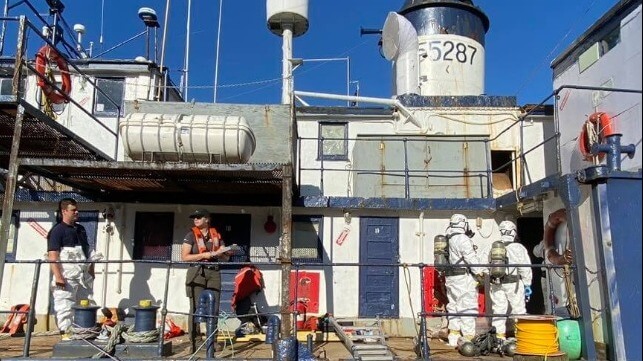USCG Responds to Ammonia Leak on Vessel with Long History of Violations

The U.S. Coast Guard and Washington state officials are responding to reports of an ammonia leak aboard a 77-year-old fishing processing vessel with a long history of violations. Teams in HAZMAT suits could be observed working on the Pacific Producer, which is moored in the FOSS Waterway in Tacoma, Washington.
Few details were provided in the report including when the Coast Guard first learned of the danger. They did say that there was no immediate threat to the public. They also did not report any injuries aboard the Pacific Producer, a seafood processing vessel built in 1946, and registered in the United States.
It was unclear if the vessel was currently in service. It has a history of violations and previously had its certificates suspended. Earlier this year, the Occupational Safety and Health Administration cited the vessel for a long list of violations including two repeat serious violations, 17 serious violations, and one “other than serious” violation. The agency proposed $209,983 in penalties. In February, they also reported that the USCG had invalidated the vessel’s certificate of compliance, halting operations until repairs were made. This came as the vessel and its operator ended five years of probation for MARPOL violations.

USCG and Washington state is managing the response to the ammonia leak (USCG)
“The Coast Guard has hired US Ecology to conduct an assessment of the ammonia system onboard and locate the source of the leak,” they said in today’s report.
A form of ammonia is commonly used on fish processing vessels both as refrigerant and in the processing plant. The current incident is at least the third time this ship has experienced a dangerous leak in its system. A 2018 report cites an ammonia leak and in 2013 the USCG and firefighters in Kodiak, Alaska responded to reports of an ammonia leak aboard what at the time was called a “derelict ship.” Newspaper articles said most of the crew including the captain and chief engineer had walked off the ship while the owner was seeking capital to resume operations.
During the 2013 incident, the firefighters were forced to cordon off a portion of the pier for five hours. They were able to get aboard and shut all the valves on the ammonia system. Subsequent air tests were negative for additional contamination.
Around that time, the vessel, which is 169 feet long and 472 tons, was acquired by Kodiak resident Christos Tsabouris. However, the change in ownership did little to improve the vessel’s record. In 2012, 2014, and 2018 OSHA reports its inspectors found safety violations. In 2022, they started a new inspection but the vessel sailed before it could be completed with the USCG finishing the inspection three months later in Seattle.

Pacific Producer aground in 2013 near Kodiak, Alaska which lead up to MARPOL violations (USCG)
OSHA report shows that its inspectors found “murky, brown water in the ship’s drinking water system; crew members being served expired food; water used to process fish leaking into dry food storage and the galley’s dining area; and other unsanitary conditions throughout the vessel. In addition, OSHA discovered employees were exposed to dangerous electrical hazards throughout the vessel, including damaged and improperly installed electrical equipment, broken outlets and outlets near water, ungrounded extension cords, and exposed wiring. Inspectors also found the vessel had no fire suppression system as required, which exposed the crew to fire hazards.”
Before that, in 2014, inspectors saw raw sewage flowing from a pipe onto the open weather deck. There was a vent pipe that discharged raw sewage onto the side of the vessel and into the water.

that matters most
Get the latest maritime news delivered to your inbox daily.
In 2013, the vessel grounded outside Kodiak, Alaska. It discharged approximately 1,000 gallons of raw sewage overboard and two weeks later the USCG alleged the vessel’s owner knowingly discharged harmful quantities of oil into the water. They also found that the vessel knowing used an illegal pump system to discharge oily bilge water overboard.
The vessel’s owner, East West Seafoods from Washington state was ordered in 2017 to pay a total of $50,000 in fines and Tsabouris was sentenced to an additional $10,000 in fines. He and the company were also placed on five years probation which meant a higher level of scrutiny, including the ability to conduct warrantless searches of the vessel based upon reasonable suspicion of further violations.
